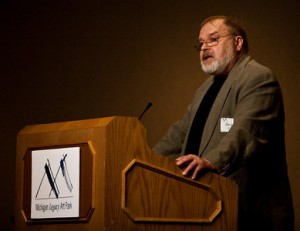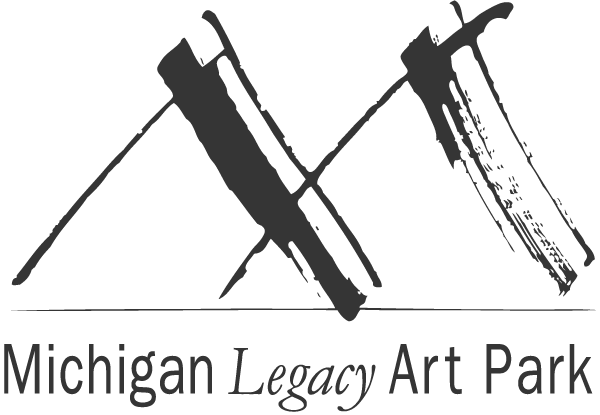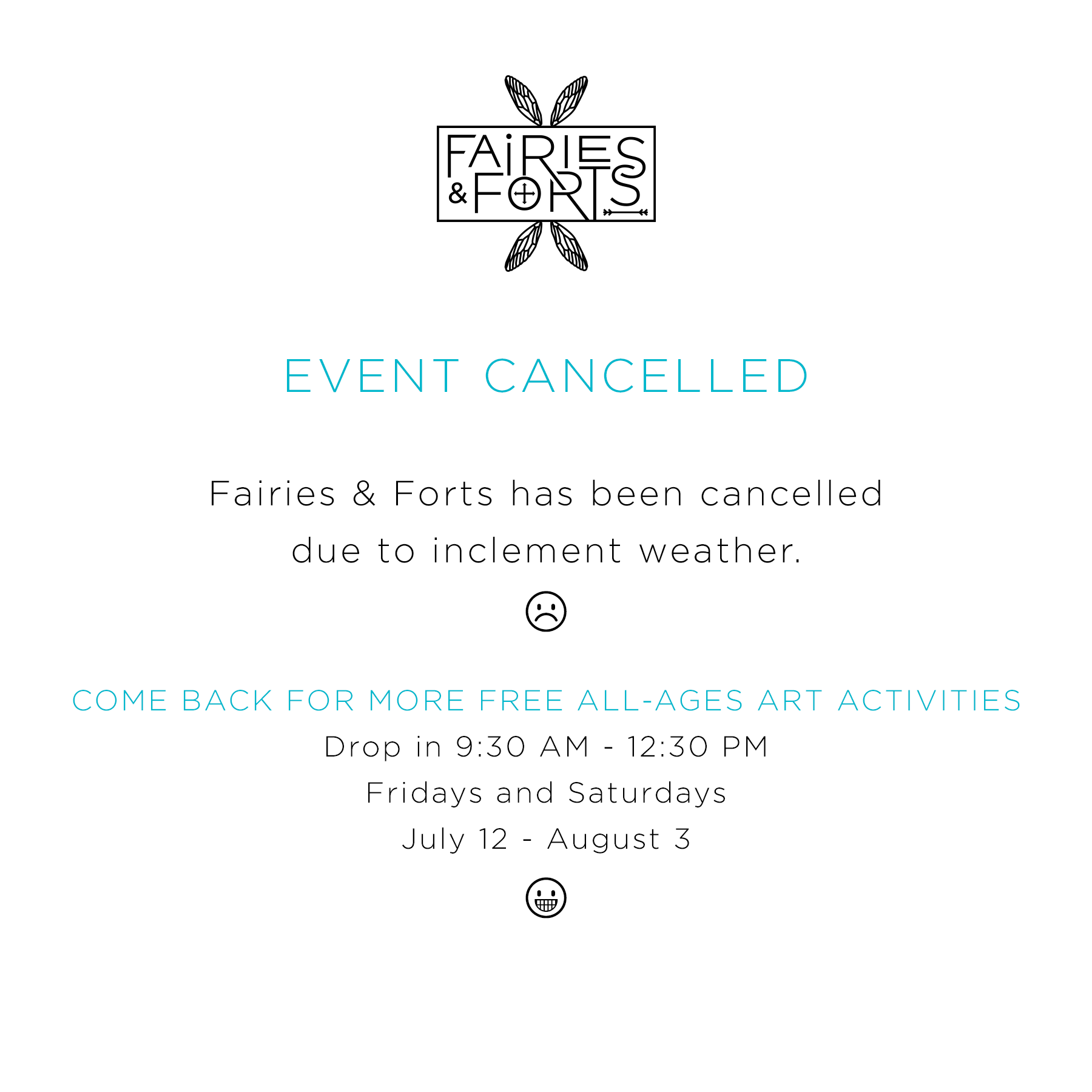
The following is David Barr's Legacy Gala Keynote Address, given August 20, 2011. David Barr is the founder of Michigan Legacy Art Park.
The State of the Art
Governor and Mrs. Milliken, Governor and Mrs. Snyder, Marilyn and Paul, members of our valiant board of directors past and present, Althea Petriz, and Jim and Chris MacInnes, Renee and Chris, Art Park friends, artists, supporters, and devoted volunteers.
We are here tonight to recognize and to express our gratitude to Governor and Mrs. William Milliken. It’s been nearly thirty years since Governor Milliken was in office, but Bill and Helen Milliken have never ceased to work for us, to grow in our esteem, to guide us by their word and their deeds. Always inspiring us with the voice of reason, they walk beside us as fellow citizens. They are both exceptional because both of them have earned and sustained our admiration and trust—whether we are Democrats, Republicans, or independents.
Bill and Helen Milliken have consistently supported art organizations and artists. They have demonstrated their commitment in official as well as personal actions and sacrifices in order to ensure that the arts may give sustenance, identity, and form to community. Tonight I will attempt to express our gratitude from the point of view of the artists and art supporters who comprise our state of the art.
Why are the arts vital to our society? What is the role of the arts in a time of war, in a time of severe economic disparity, of painful unemployment, of shrinking population? We all know the litany of doubts, insecurities, and concerns. We live them every day. As a lifelong Michigan resident and artist, I offer some answers to these questions.
The arts harmoniously connect humankind as few other endeavors do. People walk into a movie house or theater with other strangers. They weep and laugh together at the film or the play. Often they walk out talking like friends, connected by art. In a distant museum studying a Rembrandt self-portrait, we simultaneously sense Rembrandt’s innermost character, his seventeenth century Holland, and share the experience with fellow tourists from Brazil or Japan, or Palestine, or Africa. Every day Mozart, Bach, Chopin, Gershwin, or Miles Davis spring to life in vibrating concert halls or on car radios and MP3s. Each listener is spiritually revived and recharged to cope with personal or social woes. A traveling businessman, alone in a woe-begotten motel, channel surfs and finds a Buster Keaton silent film or some Marx Brothers madness that vaporizes loneliness, gloom, or disillusionment. Just read these poems written by Latino elementary school students in Southwest Detroit. They were inspired by the Detroit poets-in-residence who taught them to overcome the fear of expressing their innermost being, put it on paper, and share it with others. Or park yourself on a bench in Michigan Legacy Art Park and listen to the voices of children glorying in art and nature.
Art integrates right into the very spirit, the identity of the individual. It transcends borders. It defines that which is human. I call these experiences in the arts “the re-calibration of the self,”…re-establishment of balance that may have gone off kilter.
Many circumstances may divide us, inch by inch. Political, economic, religious, ideological, social…the values we accumulate to construct our identity have the ironic potential to harden the shell around a primal identity. A fence, a wall, a border…an attitude…may protect us, but it may also imprison us. This paradox is why we are so intensely defensive about threats to our identity, whether the threats are profound or superficial, real or imagined. A perceived threat may inflame that primal identity in the guise of a frustrated sports fan, a misguided religious fanatic, or a nationalistic zealot. An insecure identity is volatile, hysterical, and dangerous.
The Nazi Herman Goering said, “Whenever I hear the word ‘culture,’ I reach for my gun.”
The writer, Malcolm Muggeridge said, “Whenever I hear the word ‘gun,’ I reach for my culture.”
Let’s look at each of those impulses. Goering knew that “fear” and its firstborn offspring, “hate,” supersede benign emotions. We tend to make our worst decisions in the grip of fear. Fear, whether manifested by a mob or an individual, smothers rationality, understanding, and compassion—the very qualities crucial to the nourishment of that which is enlightening and productive. An atmosphere of fear is the magic wand for a tyrant like Goering. It is even more efficient than his gun. Goering’s followers, preoccupied as they were by fear, ceased to think and to feel empathy, ceased to establish the attributes of humanity; in other words, ceased to tune into their conscience and spirit of generosity—their humanness. Thus diminished, they submitted to participating in the horrors of the Third Reich. Knowledge of fear as a psychological reflex is a prime tool used in totalitarian states.
Submission to a state of fear fosters intolerance of diversity, suppression of trust, the loss of freedom, of thought, of expression, and the erosion of brotherhood. Fear crushes the soul. Muggeridge’s humanistic retort embodies this psychological insight: it is within the power of the arts to restore nobility to the human spirit. A simple example from our time, our American history: Whether in films, plays, novels, music, or poetry, the arts have played a vital role in vanquishing fear in the struggles for human rights, civil rights, and the rights of women and of children. You will think of many other examples, both in the evolution of American legislation and within your own individual evolution.
I have been a sculptor, writer, and educator for more than fifty years. I love being an artist. I feel fortunate to live in a society where I am free to make my way as an artist as well as free to create what I believe in. I confess that I did not become an artist solely in order to serve a noble social purpose. I’m afraid I am too selfish and too defiant for that. I have found that creative expression has its own rewards, not the least of which is that, since I am driven to create, I would go mad if I could not. Throughout these fifty years, I have repeatedly been challenged, in one form or another to “justify the existence of the arts.” This challenge has been hurled at me as an arts educator, an arts supporter, and as an independent artist. The phrase “Justify the existence of the arts” is disguised as a less hostile question, of course. Inevitably, it carries an implicit but fallacious disclaimer, “It’s not about the money,” when we all know that this disclaimer itself verifies that it is always about the money. By now, I’m somewhat immune to this challenge, but I am discouraged that such a cynical point of view is widespread in the wealthiest country in human history. The disappointment is not for my personal situation, but because it is a rejection of the ideals of our founders like Thomas Jefferson, John Adams, Benjamin Franklin, and James Madison, cultivated visionaries who envisioned more inclusive individual participation in the arts under Democracy than was feasible under the aristocracy. I believe the founders understood that the arts are central to an enlightened civilization. If you look at the curriculum of the private schools where the wealthy send their children, you will see that extensive training in theater, dance, music, and the visual arts is integral to the programs that shape their privileged students. Every child—rich, middle class and poor—deserves the opportunities that are graced and grown with the arts.
We all remember the days when leaders like Bill and Helen Milliken put us squarely on that path and sent the message in the idiom of the day, “Go for it.” They presided over a golden age for the arts in Michigan. Every year during the Millikens’ tenure, the Metropolitan Opera, most of the great American and international dance companies, every imaginable movie from domestic and international cinema, and fabulous art exhibitions came to theaters and museums in our state. They were not easy times, but we were fortunate to have the arts to uplift, bolster, and inspire us, to enrich our lives, to make us whole. Our state was then a destination in the American Midwest for tourists from neighboring states and Canada. The Millikens helped us plant seeds that may now be lying in fallow ground. It’s up to us and to our children to remember and revive and fulfill the potential of our society nurtured by the arts. From the poet Dante to the psychiatrist/philosopher Scott Peck, sin is defined as the failure to fulfill one’s potential. And this is backed up by the parable of the Five Talents. We know from Michigan 1983, when Bill Milliken left office, that we can and must live in a society rich in cultural experiences in order to realize our total human potential. It is a disgrace to bury our talent or to fail to achieve our potential as a society.
What is the state of the art? By definition, it must be integrated into our national consciousness. How accessible are our arts to the general public? How do we measure a civilization and not consider its public art, its architecture, its literature, its music, and its visual arts? How else do the arts enter our consciousness? Advertising? Product placement? When did we conclude that, for the first time in history, the arts will flourish if they are market driven? Is that what produced Herman Melville, Mark Twain, Ernest Hemingway, Emily Dickinson, Leonard Bernstein, Martha Graham, and Georgia O’Keefe, and Michigan’s own James Earl Jones? I don’t think so. Market driven gives us Lady Gaga, Robocop, Texas Chainsaw Massacre, Charlie Sheen, and the obscene profits of cocaine and crystal meth. I know our nation and our state are capable of better. The arts enchant and enhance our legacy, provoke and transcend us. Entertainment, on the other hand, reflects us only at our most mediocre as a vacuous distraction.
Meaningful art is not confetti, cosmetics, or confection. The arts are the enduring evidence, the truth, the aspirations, and the solace of humanity. We first find this authentic voice of the arts in pre-historic caves. Viewing their thirty-thousand-year-old drawings, prehistoric sculpture and musical instruments, we exclaim, “Here is confirmation of the presence of mankind.” Eden must lie in these caves. We find exquisite poetry written by doomed soldiers amidst the hell of World War One trenches. We find it in poignant notes scratched into concentration camp walls or on bars of soap in Gulag prisons. We find it in the musical confirmation of life accompanying New Orleans funerals. We find it sewn by Amish women whose quilts explode with glorious color and pattern. We find it in Bali, a country that has no word for “art” because art is so integrated into everyday life. In Bali, a Coca Cola is served with an exquisitely folded flower, a path is swept with the grace of a dance, a boat is a floating painting. That’s why people flock to Bali, to surround themselves with the beauty and meaning of its thoroughly integrated art.
Humankind has constructed majestic cathedrals, mosques, synagogues and temples as testaments of faith united with art. After centuries of these achievements, the arts no longer require justification. Imagine the gulag of your own life if the arts were erased or even diminished. History bears out the their indomitable value. They are not a hobby or mere entertainment. They are the fundamental heartbeat of humankind. Our questions, therefore, concern how we, living in a democracy, facilitate the growth and appreciation of the arts as a fruit of democracy.
Thinking about what I would say tonight, I was hesitant to bring up this very serious question. Perhaps the evening should be focused on only a light-hearted celebration. In the end, I concluded that an essential part of the mission of Michigan Legacy Art Park is to germinate historical context and, therefore, to acknowledge that the core ideals of Helen and Bill Milliken are parallel to those of the park—the welfare of the citizens of Michigan from the core on out. If I have miscalculated, please forgive my tedious and instructive tone…it’s a remnant of my professorial voice. I’ve gotten old, a curmudgeon really, my optimistic wife, Beth, has renamed me. Mr. Grumpy. She tolerates me because I have not become apathetic about the arts or the future of my state and my country. Being an artist has never been a hobby for me, never an incidental activity for a lazy afternoon. Loving relationships and love for the arts still comprise my life and my time. It is because of that commitment that I feel enormous gratitude to the Millikens for their accomplishments especially in encouraging the flowering of cultural life in Michigan. I feel this both in my personal life and in my life as a professional artist. Their lives have enriched the lives of many.
None of us is self-made. Such a notion is silly. We are interdependent and we must co-exist in a global village. We rely on enlightened leadership to reach our potential. Apathy can be avoided only with activism. The nature of our relationships is shaped by the nature of our consciousness. The truest reason we are here tonight is to express our gratitude, our admiration, and to confirm that our inspiration was received from the context that is your life, Helen and Bill Milliken. Your legacy includes fighting against a state of fear, fighting for civility, humanism, and the engagement of the arts in the re-calibration of the human spirit. “Justify the arts?” The Millikens personify the template for how to fulfill a nurturing mission in our society, how to contribute to our well-being and to the art of the state.
As David Barr pointed out in his keynote address, our mission is to inspire awareness, appreciation and passion for Michigan's history, culture and environment through the arts.
Help us to continue our mission by making a donation to Michigan Legacy Art Park today.
Thank you.



